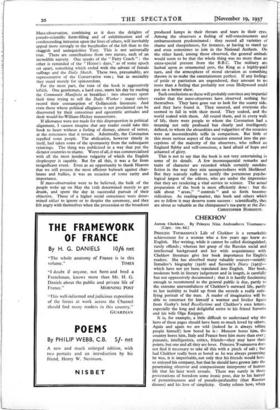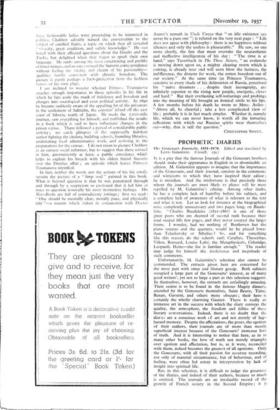CHEKHOV
Anton Chekhov. By Princess Nina Andronikova Toumanova (Cape. SOS. 6d.) PRINCESS TOUMANOVA'S Life of Chekhov is a remarkable achievement for a woman who a few years ago knew no English. Her writing, while it cannot be called distinguished, rarely offends ; whereas her grasp of the Russian social and intellectual background and her wide acquaintance with Chekhov literature give her book importance for English readers. She has absorbed many valuable sources—notably Izrnailov's biography (1916) and Suvorin's Diary (1923)— which have not yet been translated into English. Her book, moderate both in literary judgement and in length, is carefully but not oppressively documented ; that it is hardly fascinating enough to recommend to the general public is due, partly to the extreme uneventfulness of Chekhov's outward life, partly to her inability to build up from the records a really satis- fying portrait of the man. A reader of imagination will be able to construct for himself a warmer and livelier figure from Gorky's brief Recollections and Chekhov's own letters, especially the long and delightful series to his friend Suvorin and his wife Olga Knipper.
It is, for example, a little difficult to understand why the hero of these pages should have been so much loved by others. Again and again we are told (indeed he is always telling people himself) how bored he is : Moscow bores him, the country bores him, Italy and France bore him more than ever ; peasants, intelligentsia, critics, friends—they may have their points, but one and all they are bores. Princess "Faumanova does not find it necessary to take all this with a pinch of salt ; but had Chekhov really been as bored as he was always protesting he was, it is improbable, not only that his friends would have so enjoyed his company, but that he should have grown into the penetrating observer and compassionate interpreter of human life that his later work reveals. There was surely in those protestations of boredom some ironic pose, due to his hatred of pretentiousness and of pseudo-profundity (that Russian disease) and his love of simplicity. Gorky relates how, wheal
three fashionable ladies were pretending to be interested in politics, Chekhov adroitly turned the conversation to the subject of candied fruits, a topic on which they all revealed " vivacity, great erudition, and subtle knowledge." He was bored with their affected questions about the Greeks and the Turks, but delighted when they began to speak their own language. He ranks among the most entertaining and prolific of letter writers, and no one can read the Suvorin correspondence without feeling the vitality and charm of his personality— qualities hardly consistent with chronic boredom. The picture is partly perhaps a back-projection from the feckless heroes of his own plays.
I am inclined to wonder whether Princess Toumanova attaches enough importance to those episodes in his life in which he lays aside the mask of indolence and boredom and plunges into sociological and even political activity. In 1890 he became suddenly aware of the appalling lot of the prisoners in the settlement of Sakhalin, the convicts' island off th2 east coast of Siberia, north of Japan. He made the 2,000-mile journey, saw everything for himself, and published the results in a book which is said to have influenced changes in the prison regime. There followed a period of considerable public activity ; we catch glimpses of the supposedly indolent author fighting the cholera, building schools, founding libraries, undertaking local administrative work, and assisting in the preparations for the census. I do not mean to picture Chekhov as an earnest social reformer, but to suggest that there existed in him, intermittently at least, a public conscience which helps to explain his breach with his oldest friend Suvorin over the Dreyfus affair ; an episode which leaves Princess Toumanova mystifizd.
. In fact, neither the words nor the actions of his life wholly sustain the picture of a " limp soul " painted in this book. What is beyond question is that he was penetrated through and through by a scepticism so profound that it led him at times to question ironically his most instinctive feelings. His Note-Books arc full of contradictory jottings ; first we read : One should be mentally clear, morally pure, and physically tidy "—a maxim which (taken in conjunction with Docto.- Astrov's remark in Uncle Vanya that " an idle existence can never be a pure one ") is refuted on the very next page : " Life does not agree with philosophy : there is no happiness without idleness and only the useless is pleasurable." He saw, no one more clearly, the fate that must overtake the neurasthenic and ineffective intelligentsia of his day : " The time is at hand," says Tusenbach in The Three Sisters, " an avalanche is moving down upon us, a mighty clearing storm which is coming, is already near znd will soon blow the laziness, the indifference, the distaste for work, the rotten boredom out if our society." At the same time (as Princess Toumanova, sensitive to every shade of his delineation of Russia, perceives) his " naive dreamers . . . despite their incongruity, are infinitely superior to the rising new people, energetic, clever and hard." But their everlasting self-torturings and probings into the meaning of life brought an ironical smile to his lips. A few months before his death he wrote to Mme. Avilov : " Above all, be cheerful ; take a less complicated view of life ; probably it is in fact much simpler. Whether it, namely life, which we can never know, is worth all the torturing reflections with which our Russian spirits wear themselves out—why, that is still the question."
CHRISTOPHER SHAWE.

















































































































 Previous page
Previous page